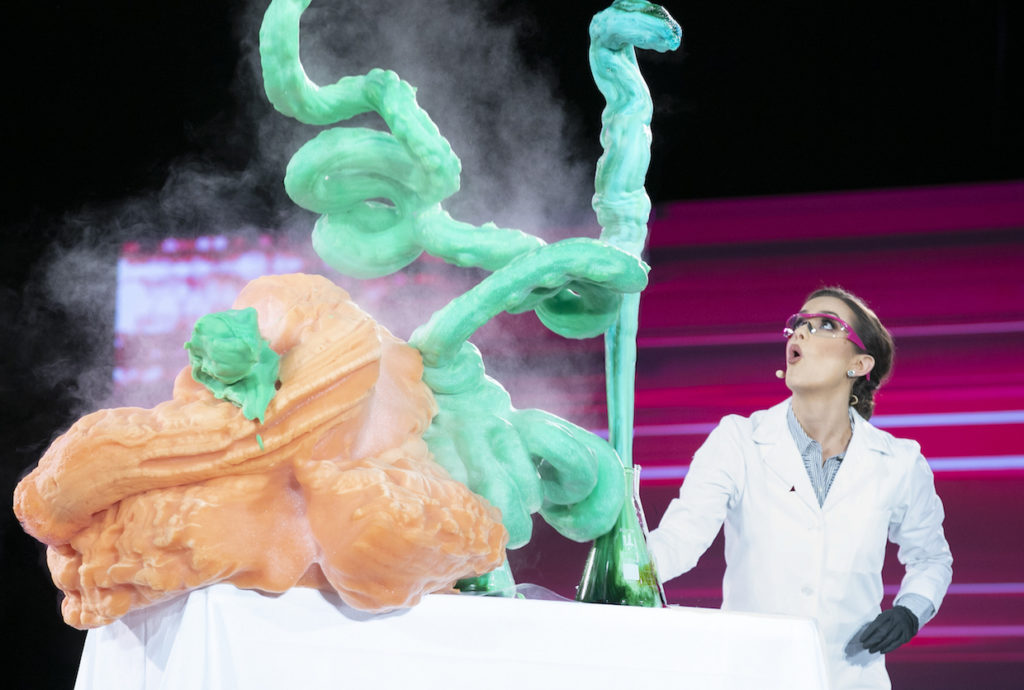Both serve as national icons, the President of the US and Miss America, but they represent institutions not normally brought together, although President Trump does have a history with beauty pageants.

Both figures were in the news this week. It so happens that the recently crowned Miss America, Camille Schrier, is a VCU student, working towards a doctorate in pharmacy. Her talent in the contest was doing chemistry experiments, with eye-popping results. She was back at VCU this week as part of her national tour to promote medication safety and to prevent drug misuse. She has said that her mission was also to promote science careers for girls, stating in an interview, “I’m trying to be like Bill Nye [the science guy]…That’s what I’m going for. I want to get kids excited, but I don’t want it to be boring.” Although in the pageant, Schrier wore a white lab coat and safety goggles for the talent performance, it’s clear that if she were not an attractive woman, she would not have earned the crown. However that may be, she is leveraging the exposure and publicity she is receiving to engage in public service, something in fact that is expected of every Miss America. In that sense she is working within normal institutional parameters.
That is hardly the case recently for many US politicians, including not only the President, but members of Congress as well. Their behavior in the impeachment process has been largely dictated by personal political interests, not by a concern to strengthen the institutions they represent. That’s not true of all those in Congress, but it’s a pattern that we’re seeing more often, and not just in politics. Self-interest rather than institutional support has become a driver of actions and attitudes, leading to wide-spread distrust of institutions in the US.
That’s laid out in a new book by Yuval Levin, A Time to Build: From Family and Community to Congress and the Campus, How Recommitting to Our Institutions Can Revive the American Dream, recently discussed with the author on NPR. In the interview Levin points out that many members of Congress “think about the institution as a way to raise their profile”, for example, Senator Ted Cruz after every session of the impeachment trial hosting a podcast commenting on the session. While Levin comments that it is legitimate “for important public figures to also have a profile in the culture”, doing so excessively and making that one’s major focus, “makes it much harder for the institution to function and much harder for us to trust it”:
When members come to think of Congress as a platform for themselves, it becomes much harder for them to see how working within the institution cooperating and bargaining is really what Congress is for…What happens in most congressional hearings now is basically a bunch of individuals producing YouTube clips to use later in campaigns.
One can make the same argument for President Trump, who has used the institution of the presidency as a platform, through Twitter, to promote himself:
President Trump is the first of our presidents who has not been formed by any of the institutions of public service in our country. President Trump has been a performer his entire adult life, and he’s been a performer as president, too. He uses the office of the presidency as a platform from which to comment on the government.
In the process, he is debasing the institution of the Presidency, leading to growing public mistrust. This is all the more disturbing given the power of that office. Levin sees this as a lesson for us all:
All of us have some roles to play within some institutions, even if that’s our family or community or workplace, let alone national institutions and politics and the economy. As a as a parent, as a neighbor, as a member of the PTA, as a member of Congress, as a CEO, what should I do in this situation? Not just what do I want, not just what would look good, but given my role here, what should I do? It is a question you ask when you take the institutions that you’re part of seriously.
In other words, in the institution in which we are involved, we should all be focused on civic engagement. Our current Miss America can function as a model. While she had participated in pageants as a girl, she stopped on starting college, as she wanted to focus on her interest in science (she has undergraduate degrees in biochemistry and systems biology). When she was a graduate student, she heard that the Miss America pageant had been revamped — eliminating the swimsuit competition and emphasizing professionalism and social impact. That provided an opportunity for her to showcase her own interest in science and potentially to serve as a role model and mentor for girls, demonstrating that, in her words, “Miss America can be a scientist and a scientist can be Miss America”. She is using the institution, as she found it, to further goals of inclusion and acceptance, not self-interest.